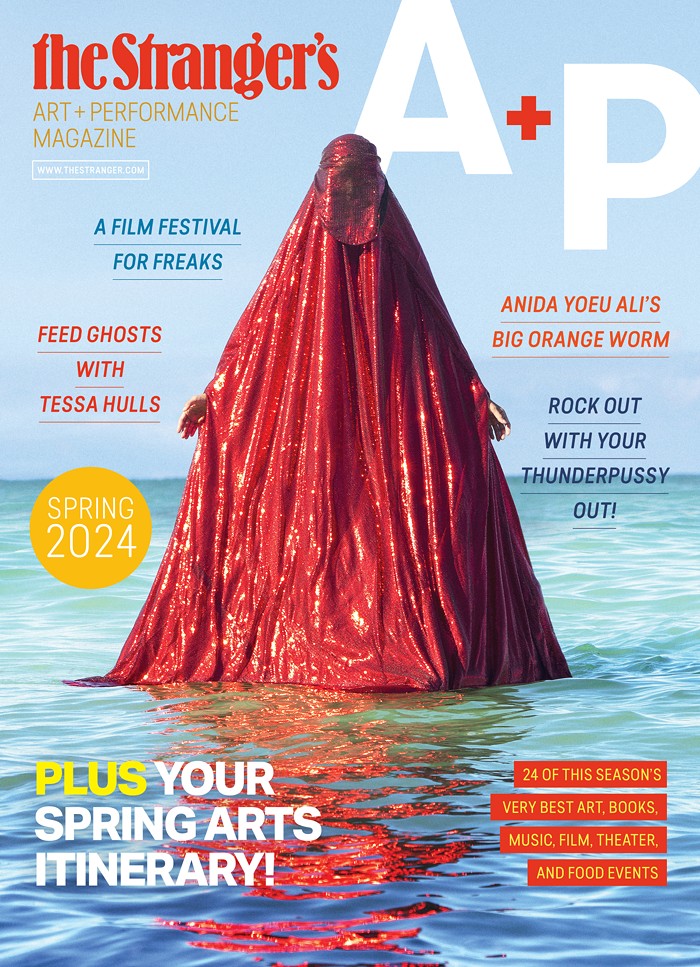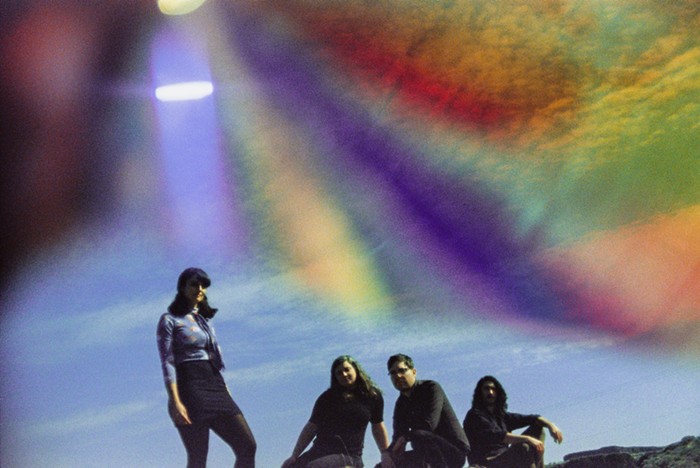
We're all intimately familiar with the paradox of feeling alone in the middle of a city. We're constantly surrounded by people, and yet the crush of bodies anonymizes each of us, makes us feel lonelier than we'd feel in some small town where at least the bartender is counting on us to walk through the door and play our part in life. Though the subject has received finer treatment elsewhere, I'm forever ruined by Gavin Rossdale staring into the camera in the music video for "Glycerine" and issuing the dorm room koan, "I'm never alone. I'm alone all the time." Us too, buddy. Us too. (But for real.)
In all the novels and movies, New York City is often portrayed as the capital of this emotion. Artists, writers, and filmmakers (but weirdly NOT Gavin Rossdale) use the city's rush-hour sidewalks and reflective subway windows to really drive home the fact of our absolute loneliness. But this month, Seattle-based art collective Vignettes has teamed up with Gramma Press to make an argument that the fastest-growing American city of the decade is a worthy location for considering the subject, too.

For the citywide exhibition, a lone, Vignettes and Gramma installed work from some pretty incredible bicoastal artists and writers. Taken together the project juxtaposes everything that's great about living in a city—its wild daily surprises, its massive scale, its seemingly infinite and fascinating complexities—with everything that's not so great about the city (its random violences, its insurmountable obstacles, its labyrinthine systems).
As you bounce between these contradictions, you come to the one at the core of the project: all this time you've been having a deeply personal experience with an incredibly impersonal city. In this way, the act of participating in a lone provides the cure for the poison that drove its creation. And in general, a lot of the work is funny, beautiful, sweet, poignant, and politically powerful, and it's all definitely worth exploring over the course of a few weekend afternoons.
Let's look at a couple of my favorites so far.

On the side of Photographic Center Northwest at 12th Ave and Marion St, you'll see Charlottesville by Brooklyn-based multimedia artist Alexandra Bell. This piece comes from a series called Counternarratives, wherein Bell installs herself as the front page editor of the New York Times and offers up her corrections to the paper of record. She wheat-pastes the marked-up page next to her more accurate version, one that tells the story of violent racist acts without the obfuscations of euphemism, bad layouts, and bothsidesism. On a semi-related note, I wish she was around for that time when Seattle Times put a photo of Bill Clinton above the fold the day after Hillary became the first woman nominated for President by a major political party.

I know I already mentioned Leena Joshi's hilarious but also kinda sad nod to the endless exodus of Seattle's priced-out "bad bitches," but it's worth mentioning again in the body of this post, where it's easier for me to link to a photo of the old 1971 billboard she's referencing.
In a statement about the billboard, Joshi writes, "When Bob McDonald and Jim Youngren, two white, middle-aged real estate agents in Seattle put up the iconic billboard reading 'Will the last person leaving Seattle — Turn out the lights,' they did so out of their own brand of despairing hilarity at the completeness of the economic downturn and its effect on the city. Seattle seemed unsalvageable. And yet, look at it now. Fully salvaged! Bursting from the seams with the young tech elite who pour into the city by the week, ready and able to pay a few grand for any apartment and even more ready to seize any further opportunity to capitalize on the place."
She goes on to list the people who can no longer afford the fully salvaged city, including "black and brown people...queers...freaks...and bad bitches who have consistently hustled their art and their work to make ends meet and live in relative spiritual peace despite a town that increasingly looks on their lives and priorities as useless in the face of capitalist production." It was ever thus.

Then there's Martine Syms's Nite Life, which your drunk ass has probably seen while stumbling down Broadway. Syms drew inspiration for her banners from the work of nightclub promoters on the "Chiltin' Circuit," a group of venues where black musicians could play during segregation.
The big banner on Broadway repurposes language from a recording of Sam Cooke's Live at the Harlem Square Club album, which famously marked the difference between the Sam Cooke white people heard on the studio albums and the Sam Cooke black people saw when he was out on tour.
If you want a little taste of that difference, please compare:
"The purple side is Sam Cooke, and the white side is the audience response," Syms explains in an interview with O, Miami. "He keeps asking 'is everyone okay,' which I think out of context has a nice ring to it. Also, thinking about who he was speaking to at the time he was speaking to them, there's sort of multiple layers to what he's asking."
Tommy Pico's audio installation, iLone, is also worth checking out. If you go to this website, you can download the audio on your phone and then walk around town while one of the best poets in the country whispers and weeps and sings and cracks jokes in your lonely little ear. Here's an indicative line from one of Pico's many observations about the city: "Can I just say Seattle is a trick. Cuz all the boys wanna wear nail polish, but none of them wanna suck dick." The monologue/poem/urban-traipsing experience had me laughing and nodding along and seeing all the old buildings and glass boxes and construction workers with fresh eyes.
This weekend should be nice-ish! So print out the a lone map and walk or bus around the city by yourself. If the idea of walking around alone bums you out too much, try to remember these lines from the poet Ocean Vuong: "loneliness is still time spent / with the world."
If you and the world aren't on good terms at the moment, try "Islands" by Muriel Rukeyser: "O for God’s sake / they are connected / underneath," she says of the apparently solitary landforms.



















